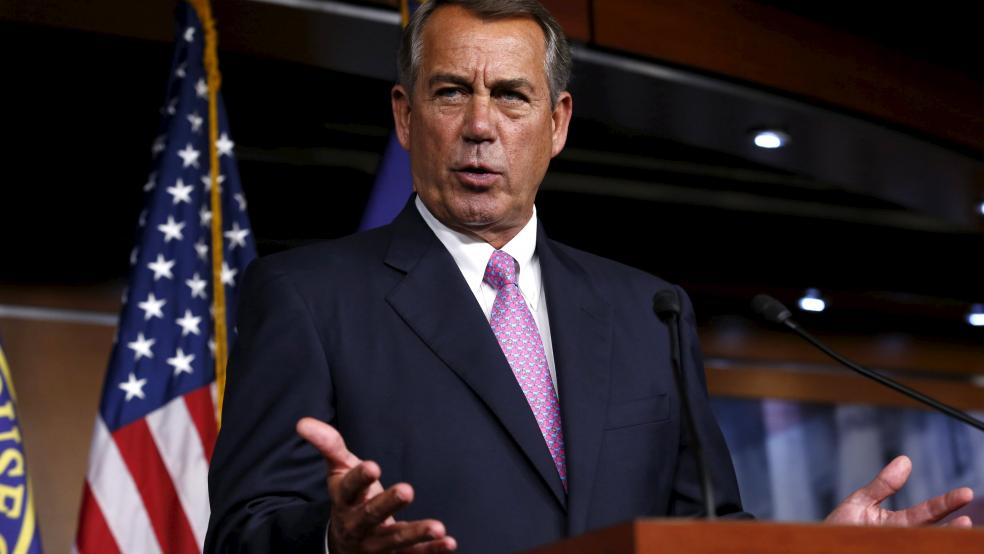WASHINGTON (Reuters) - Speaker of the House John Boehner's call for an end to the U.S. oil export ban is the latest sign of increased momentum for repealing the 40-year-old restriction, joining a drumbeat of similar appeals ranging from industry groups to Republican candidates for president.
But reversing the law still faces one significant hurdle: lining up enough support from congressional Democrats.Boehner said Wednesday for the first time that he supports lifting the ban, claiming it would help lower gasoline prices, create about 1 million domestic jobs in oil drilling and related industries and would be good for U.S. allies, some of which are eager to lessen dependence on crude from Russia."Until recently, our nation's energy policy was rooted in a scarcity mindset that went back to the 1970s," the Republican House leader told reporters. "But now America is experiencing an energy boom, and our policy needs to follow suit."Representative Joe Barton, a Texas Republican, introduced a bill in February to repeal the trade restriction that Congress put into place after the early 1970s Arab oil embargo led to fears of global energy shortages. The measure has 97 Republican co-sponsors, but only 13 Democratic ones. Most of them are from leading oil-producing states. Senator Lisa Murkowski, the head of the Senate energy committee, has 14 co-sponsors in her chamber for an oil export bill. Only one is a Democrat: Senator Heidi Heitkamp of North Dakota, the top oil-producing state after Texas."Boehner's support moves the House closer to a vote, but the increasingly partisan nature of support may be moving the issue into Keystone territory," said Kevin Book, an analyst at ClearView Energy Partners in Washington. The reference to the Keystone debate - in which President Barack Obama vetoed a bill to approve a pipeline that would carry heavy oil from Canada to Nebraska - reflects the potential for energy issues to run aground over partisan divisions. Republicans had made the bill their top priority in Congress this year.On the surface, the administration does not appear dead set against reversing the ban. It opened the door to exports late last year on its own, by defining what kind of ultra light oil can shipped.But Obama has been reluctant to go further, with administration officials suggesting that any move to lift the ban entirely should come from Congress.Yet Obama would almost certainly want to see a significant level of Democratic support for lifting the ban before signing legislation. And so far, calls for overturning it have been dominated by Republicans.Several Republican presidential candidates, from Governors Jeb Bush and Scott Walker to Senators Rand Paul and Marco Rubio, have dismissed the ban as antiquated. Democratic front-runner Hillary Clinton has not talked about the issue. Many Democrats are wary of crossing the interests of independent refinery workers, whose industry profits from the ban on crude exports that keeps domestic prices below the international benchmark. Senator Maria Cantwell of Washington State, the top Democrat on the energy committee, said she wants the ban in place until more is known about whether it would boost gasoline prices in the Pacific Northwest. Cantwell has also expressed concern that added exports would increase the volume of crude shipped by rail, a possibility fraught with safety concerns after several derailments across the country. Democratic Senators Ed Markey of Massachusetts and Robert Menendez of New Jersey are staunch supporters of the ban. Murkowski is trying to woo Democrats, partly through trade-offs in any legislation that would allow more states to share in the revenues from off-shore drilling. (Reporting by Timothy Gardner; Editing by Bruce Wallace)Boehner adds weight to effort to end U.S. oil export ban, but Democrats needed

© Yuri Gripas / Reuters



